Полиэфир Геограмм is a high-performance material widely used in civil engineering, construction, and landscaping applications. Known for its strength, durability, and versatility, Полиэфир Геограмм provides effective soil reinforcement, контроль эрозии, and ground stabilization. In this article, we explore the benefits and applications of Полиэфир Геограмм, and why it is the go-to solution for modern construction and landscaping projects.
What is Polyester Geogrid?
Полиэфир Геограмм is a type of geosynthetic material made from high-strength polyester (PET) fibers, which are woven or knitted into a grid structure. The primary function of polyester geogrids is to reinforce soil, providing added stability in areas where heavy loads or unstable ground conditions exist. These geogrids offer superior performance compared to traditional reinforcement materials, making them ideal for a wide range of engineering and construction projects.
https://lygeosolution.com/product/polyester-biaxia…iaxial-geogrid-1/
Polyester geogrids are designed to improve soil bearing capacity by distributing loads over a larger area, preventing soil displacement, and reducing settlement. These geogrids can withstand a variety of environmental conditions, making them suitable for use in a range of climates and terrains.
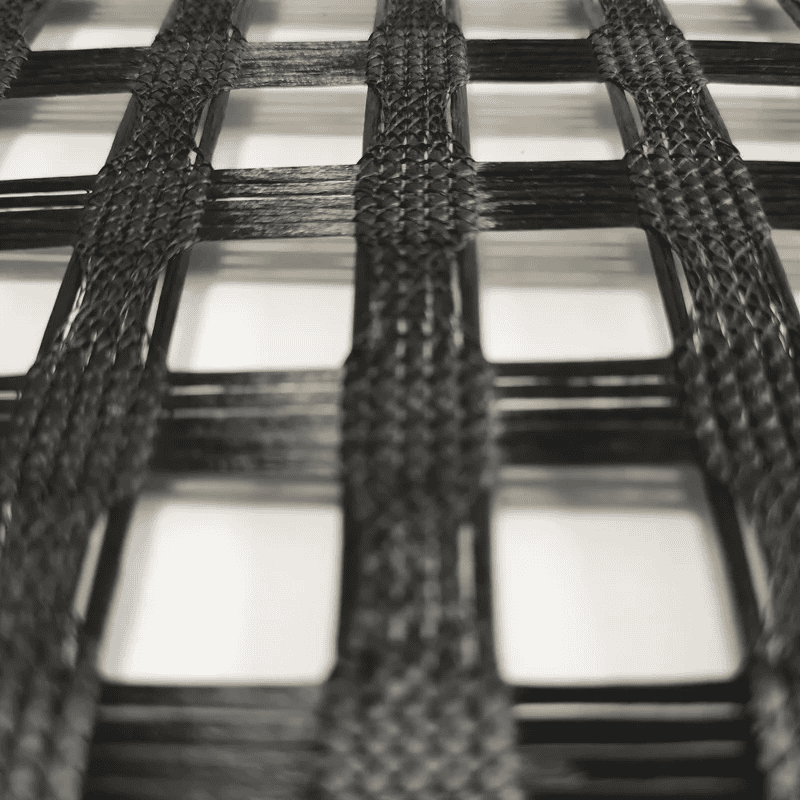
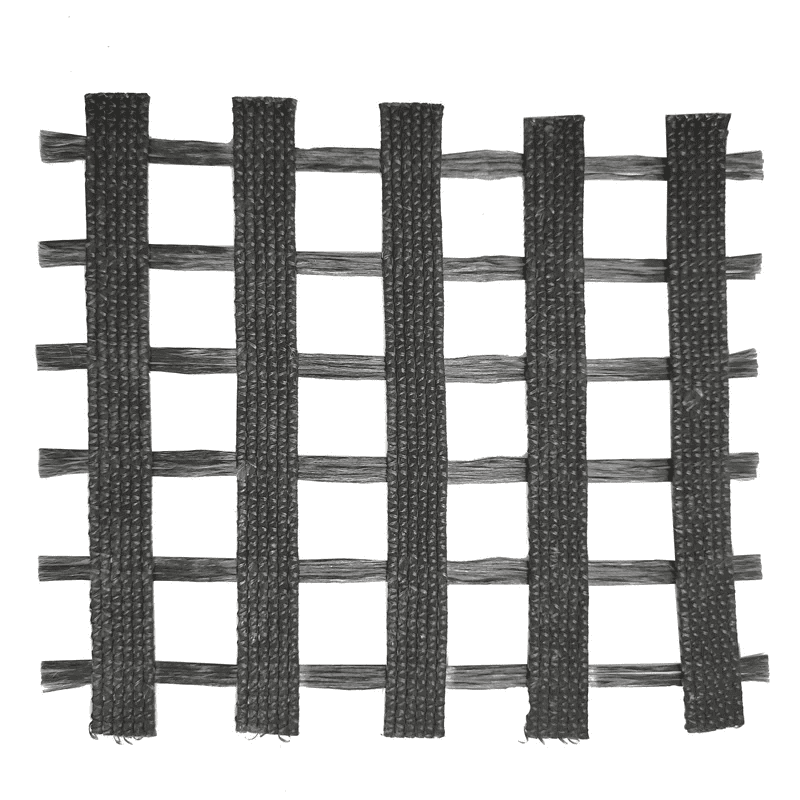
Why Choose Polyester Geogrid?
1. High Strength and Durability
One of the key advantages of Полиэфир Геограмм is its exceptional tensile strength. Polyester fibers are known for their high resistance to stretching, making the material highly durable and capable of withstanding significant load-bearing stresses. This makes polyester geogrid an ideal choice for soil reinforcement in areas subject to heavy traffic or weight loads, such as highways, железные дороги, and industrial sites.
https://www.facebook.com/share/p/1F3p9Cht7m
2. Excellent Resistance to Environmental Conditions
Polyester Geogrid has excellent resistance to both UV degradation and chemical exposure. Its ability to withstand harsh environmental conditions makes it suitable for use in projects exposed to moisture, chemicals, and extreme temperatures. The UV resistance ensures that polyester geogrids maintain their strength and performance even in long-term outdoor applications, making them perfect for long-term civil engineering projects.
3. Cost-Effective Soil Stabilization
When it comes to ground stabilization, Полиэфир Геограмм is a cost-effective solution. It reduces the need for traditional soil treatments or deep excavation, offering significant savings on materials and labor. By enhancing the stability of soil with minimal effort, polyester geogrid helps to prevent costly repairs and maintenance, making it a smart investment for long-term construction and infrastructure projects.
4. Versatile Applications
Polyester Geogrid can be used in a variety of applications, including:
- Road Construction: Reinforces subgrade soil to support heavy loads in road construction and highway projects.
- Railway Stabilization: Provides added support to railway tracks, preventing displacement and ensuring smoother operations.
- Slope Reinforcement: Prevents soil erosion on slopes, embankments, and retaining walls by stabilizing soil layers.
- Landfills and Waste Management: Helps in the reinforcement of landfill cells and containment areas, preventing shifts in the ground.
- Agricultural Applications: Stabilizes soil in agricultural fields, enhancing productivity by controlling erosion.
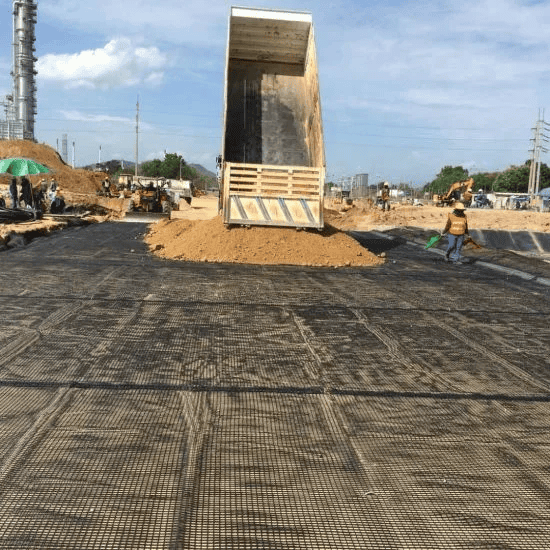
How Polyester Geogrid Works
The grid structure of Полиэфир Геограмм is designed to interlock with the surrounding soil particles, creating a reinforced soil mass. When loads are applied to the ground surface, the geogrid distributes these forces over a larger area, minimizing the pressure on the underlying soil. This load distribution reduces soil settlement and enhances the overall stability of the structure or landscape.
In road construction, for example, polyester geogrids are often placed within the subgrade or subbase layers of roads to help distribute the load from vehicles and traffic. The result is a stronger, more stable road surface that can handle heavy traffic without the risk of cracking, rutting, or premature wear.
Benefits of Using Polyester Geogrid in Construction and Landscaping
1. Enhanced Load-Bearing Capacity
By using polyester geogrids in soil reinforcement, the load-bearing capacity of the soil is significantly increased. This is especially crucial in areas where the soil is weak or unstable, such as in flood-prone zones or in regions with poor ground conditions. The use of polyester geogrids improves the structural integrity of roads, железные дороги, and foundations.
2. Erosion Control and Slope Stability
Полиэфир Геограмм is widely used in erosion control applications. By reinforcing slopes and embankments, it helps prevent soil erosion caused by wind or water. The geogrid stabilizes the soil, providing a solid foundation for vegetation and preventing the erosion of valuable topsoil. This is particularly useful in hilly or mountainous areas, where soil erosion can lead to costly damage to infrastructure.
3. Reduced Maintenance and Longevity
One of the most attractive features of Полиэфир Геограмм is its low-maintenance nature. Once installed, the material requires minimal upkeep. It has a long lifespan, especially when used in conditions where other materials might degrade or fail. Its durability reduces the need for frequent repairs or replacements, saving time and money in the long term.
Applications of Polyester Geogrid
1. Road and Pavement Construction
Polyester Geogrid is commonly used in the construction of roads, highways, and pavements to stabilize the underlying soil and prevent settlement. The use of geogrids in road construction enhances the load distribution, prolonging the lifespan of the road and reducing maintenance costs. It also minimizes the need for deep excavation or expensive foundation treatments.
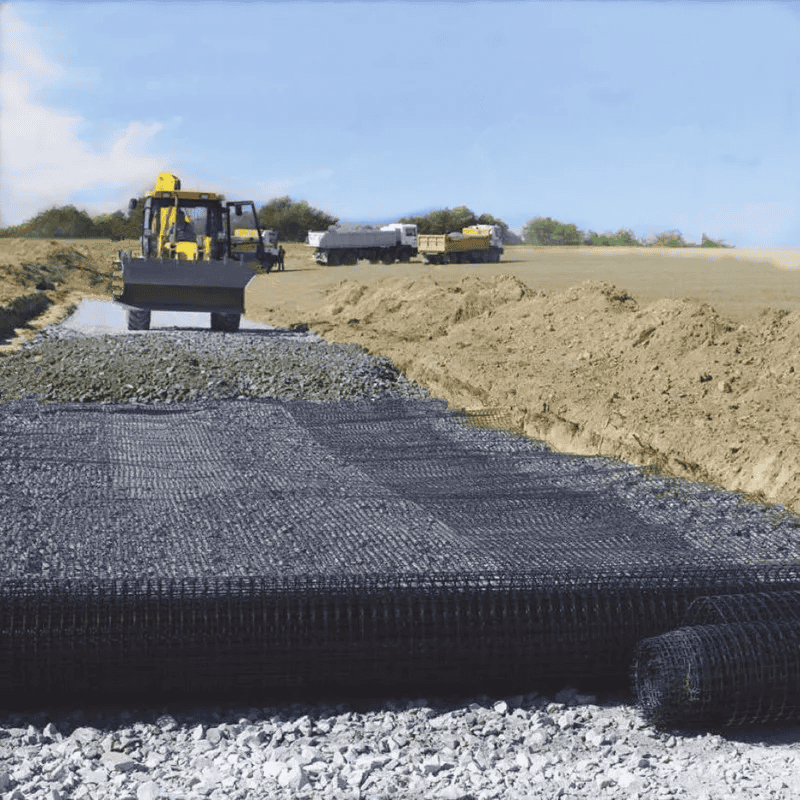
2. Railway Tracks Stabilization
In railway construction, Полиэфир Геограмм helps prevent the displacement of the ballast and supports the tracks under heavy loads. This ensures smoother rail operations and reduces the risk of track failures.

3. Slope and Embankment Reinforcement
Polyester geogrids are often used in the reinforcement of slopes, embankments, and retaining walls to prevent soil erosion and improve slope stability. This application is crucial for preventing landslides and erosion in regions with unstable soil conditions.
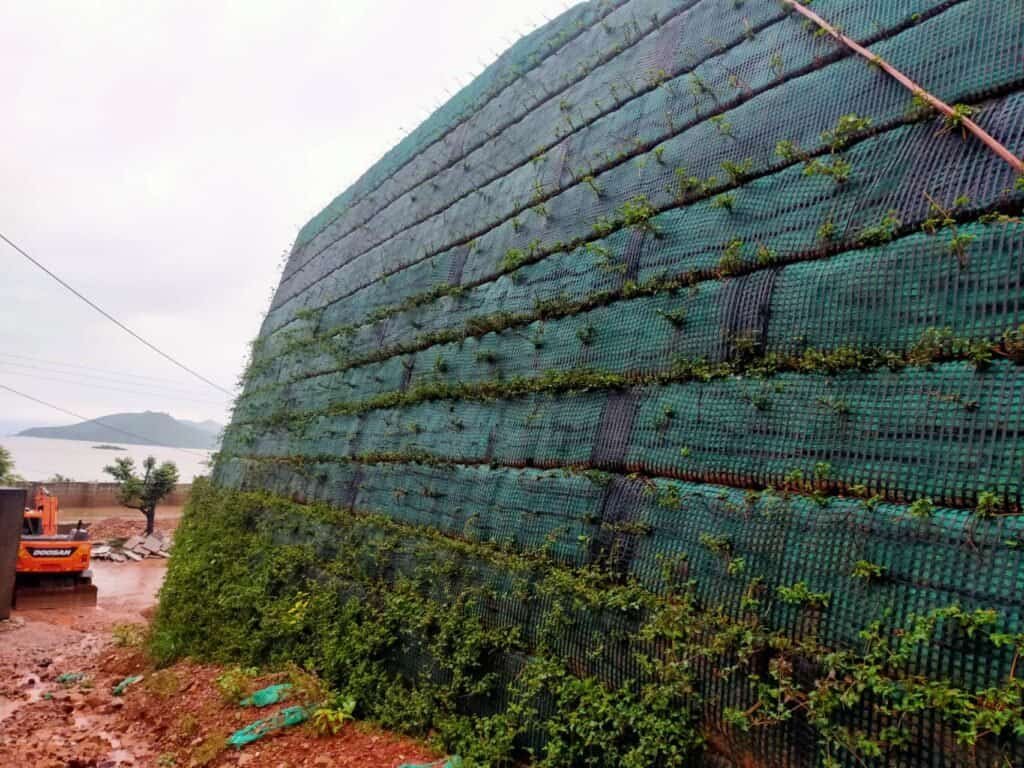
How to Install Polyester Geogrid
The installation of Полиэфир Геограмм is a straightforward process that involves laying the material over the prepared ground and securing it in place with anchors or pins. The grid structure should be stretched taut to ensure maximum effectiveness. Once the geogrid is installed, the area is typically covered with additional soil, gravel, or other materials to complete the reinforcement process.
Why Choose Our Polyester Geogrid?
At [Your Company Name], we offer premium Полиэфир Геограмм products that are designed for maximum strength, durability, and performance. Our geogrids are made with high-quality polyester fibers, ensuring long-term reliability and superior load distribution. Whether you’re working on a road construction project, railway stabilization, or slope reinforcement, our polyester geogrids provide the stability you need to ensure the success of your project.
With our expertise in the field of geosynthetics, we are dedicated to providing tailored solutions to meet the specific requirements of your project. Choose Полиэфир Геограмм from [Your Company Name] for innovative, рентабельный, and environmentally friendly solutions to your construction and landscaping needs.
Conclusion
Полиэфир Геограмм is a versatile and essential material in modern construction, providing reliable soil reinforcement, контроль эрозии, and load-bearing support. Whether you’re building roads, stabilizing slopes, or reinforcing railway tracks, polyester geogrid ensures that your project is strong, durable, and cost-effective. Choose [Your Company Name] for high-quality Полиэфир Геограмм solutions that offer long-term performance and value.






